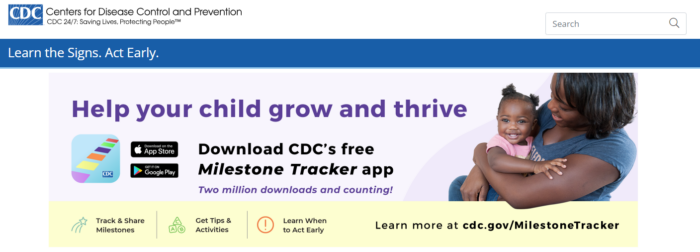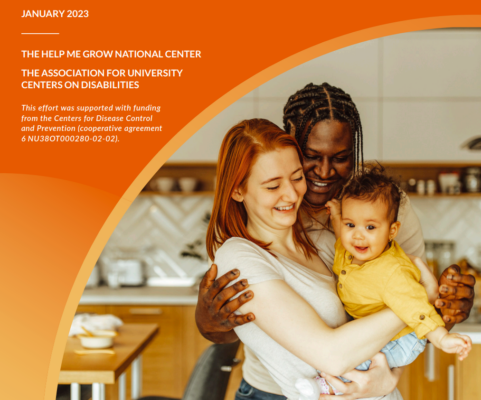- This event has passed.
One Big Doable Thing! Elevating Comprehensive Developmental Promotion and Preventive Services With the Family-Engaged Well Visit Planner Approach

Promoting the healthy development and flourishing of young children by fostering early relational health is critical for comprehensive well-child services. Despite long-standing recommendations for comprehensive early developmental promotion and prevention services, gaps in access and quality are significant.
Join the Early Childhood Developmental Health Systems (ECDHS): Evidence to Impact Center on Tuesday, September 10, 2024, from 1:30-3 PM EDT for the webinar “One Big Doable Thing! Elevating Comprehensive Developmental Promotion and Preventive Services With the Family-Engaged Well Visit Planner Approach.”
Presenters will share how to leverage existing system strengths and implement the Cycle of Engagement Well Visit Planner approach, which is designed to advance “through any door” health promotion and prevention services. Participants will learn about child flourishing and available data to inform and spark state and local partnerships and hear about the practical application of the Well Visit Planner in a community health center setting.
This webinar is for family leaders, early child health professionals and system leaders, and community-based partners working to foster early relational health and child and family flourishing. By the end of the webinar, attendees will be able to:
- Identify mindsets and pathways for leveraging existing early childhood systems to improve access to comprehensive health promotion and preventive services that engage families in ways that effectively promote the early relational health required to foster whole child and family flourishing.
- Learn about how the family-engaged Well Visit Planner approach addresses key requirements, including comprehensive early developmental screening aligned with Bright Futures and challenges related to assuring high-quality, personalized well-child services that put families at the center and connect the pediatric health system with the broader early childhood system.
- Explore the application of the Well Visit Planner approach through a case example in a community health center and consider how this approach addresses existing barriers to the comprehensive, family-engaged, personalized care needed to improve access to and the quality of well visits during early childhood.
CEU credits will be available to those who attend the live webinar.
Speakers
Christina Bethell, PhD, MBA, MPH, Director, Child and Adolescent Health Measurement Initiative (CAHMI)
Christina Bethell, PhD, MBA, MPH, is a professor at the Johns Hopkins Bloomberg School of Public Health and School of Medicine. Her research focuses on building and translating the science of healthy development of children, youth, families, and communities. With roots in national and state health care policy, financing reform, and delivery system redesign, Dr. Bethell is the founding director of the Child and Adolescent Health Measurement Initiative (CAHMI) which, since 1996, has worked to promote the early and lifelong health of children, youth, and families through family-centered data, tools, and research. She has developed and advanced an array of child and family health measures to address the social and relational roots of well-being and the quality of health care systems and structures that influence well-being, including nationally and internationally used measures of the family-centered medical home, adverse childhood experiences (ACEs), positive childhood experiences, family resilience, child flourishing, and the Whole Child Risk Index. Her research has led to the development of the national Prioritizing Possibilities agenda to prevent and address ACEs, providing testimony to the U.S. House Committee on Oversight and Reform on identifying, preventing, and treating childhood trauma, informing the American Academy of Pediatrics relational health policy statement and the design of the Engagement In Action (EnAct!) Framework to catalyze statewide integrated relational systems of care. She earned an MBA and an MPH from the University of California, Berkeley and a PhD in public policy and health services research and policy from the University of Chicago.

Barbara Leach, Family Support Specialist, UNC School of Social Work
Barbara Leach is a family support specialist and special projects coordinator with the Family Support Program at the UNC School of Social Work. She has more than 30 years of personal and professional experience advocating for families with children who have intellectual/developmental disabilities and other special needs. She served as project coordinator for two successful Family Support 360 Projects of National Significance, which were funded by the U.S. Administration on Developmental Disabilities. A key component of these projects was the use of a “family navigator” to assist families to identify family-driven goals, develop plans, and support families in goal achievement. In addition, family navigators facilitated access to formal and informal services and resources and modeled skills needed for individual and family advocacy and empowerment. Barbara played a key role in developing the family navigator role and job description that the Family Support 360 Projects used across the country. She is the recipient of the 2019 Excellence in Community Engagement Award.

Louis Appel, MD, MPH, Director of Pediatrics, People’s Community Clinic
Louis Appel, MD, MPH, serves as director of pediatrics at People’s Community Clinic in Austin, Texas. Dr. Appel provides primary pediatric care at the clinic in addition to overseeing the clinical programs. At the clinic, he has championed the promotion of early relational health and projects on group pediatric well-child checks, postpartum depression screening, lactation support, and childhood obesity prevention focused on the prenatal and immediate postpartum periods. He is a member of the Harvard Center on the Developing Child’s Pediatric Innovation Initiative working to develop a panel of biomarkers of chronic stress activation in children. He is the immediate past president of the Texas Pediatric Society. In the past he also has served as the Community Access to Child Health (CATCH) program facilitator for District VII of the American Academy of Pediatrics. A graduate of Princeton University, Dr. Appel received his medical degree from Harvard Medical School and obtained his MPH at the Harvard School of Public Health, with a concentration in public management and community health. He completed his pediatric residency at the University of Washington in Seattle.








